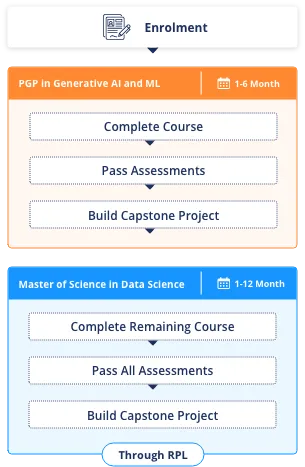The Indian pricing is inclusive of GST for all learners.
The combo price offer is valid only with full upfront payment for a limited period of time.
Finance (EMI) option is available for learners who prefers flexible payment options.
Integrated MS+PGP Program in Data Science & AI
Elevate your career with dual, industry-recognized certifications in Artificial Intelligence
-
Earn dual certifications within 12 months instead of standard 24 months
- Fast track your learning through RPL (Recognition of Prior Learning
-
Dual Certification Phase 1: Earn PGP in Generative AI and ML in 6 months
- Dual Certification Phase 2: Accelerated MS in Data Science from Birchwood University
- Learn through a perfect blend of live online and asynchronous learning modules
- Work on real-world AI projects and build a strong industry-ready portfolio
- Get both programs at a special combo price with our Learn More, Pay Less initiative
Earn two career-defining certifications within 12 months through our RPL enabled learning pathway. Begin with a 6-month PGP in Generative AI and ML, then progress to an accelerated MS in Data Science from Birchwood University. Learn through live and self-paced modules, work on real projects, and join us now to get a special combo price.
















